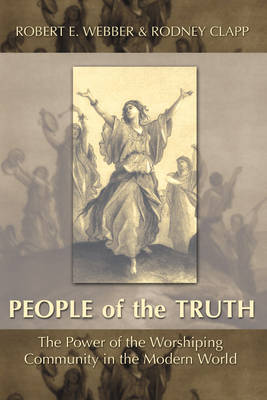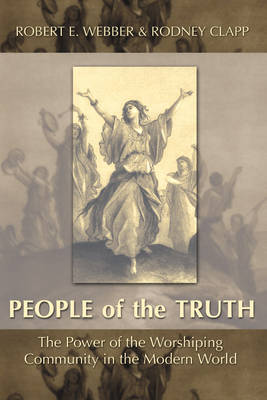
En raison d'une grêve chez bpost, votre commande pourrait être retardée. Vous avez besoin d’un livre rapidement ? Nos magasins vous accueillent à bras ouverts !
- Retrait gratuit dans votre magasin Club
- 7.000.000 titres dans notre catalogue
- Payer en toute sécurité
- Toujours un magasin près de chez vous
En raison de la grêve chez bpost, votre commande pourrait être retardée. Vous avez besoin d’un livre rapidement ? Nos magasins vous accueillent à bras ouverts !
- Retrait gratuit dans votre magasin Club
- 7.000.0000 titres dans notre catalogue
- Payer en toute sécurité
- Toujours un magasin près de chez vous
The People of the Truth
The Power of the Worshipping Community in the Modern World
Robert E Webber, Rodney Clapp
Livre broché | Anglais
39,95 €
+ 79 points
Description
In this provocateive book, a prominent theologian and a leading Christian editor speak to all Christians who have grown mistrustful of the church's involvement in religio-political power-plays and are seeking the way home. Robert E. Webber and Rodney Clapp examine the dilemma so many Christians face--what to do if you are an enthusiast for neither the New Right nor the Old Left but still take seriously the church's social and political responsibility. 'People of the Truth' offers a biblical solution to this perplexing question. The authors show how American Christians have come to depend on the nation, rather than the church, as their primary instrument of social change and communal influence. They call for the church to move beyond the dead end of civil religion to affirm the authentic role of the worshiping community in effecting social change. The church should dare to lay down its life, the authors write, to give up its ill-begotten political leverage; to turn aside from success and stop counting heads (or dollars); to stand at the side of forgotten poor and oppressed; to be a sign and a witness of humanity's insufficiency and God's all-sufficiency. Drawing upon the works of many esteemed theologians and historians, the authors trace the growth of Christianity and offer a fresh apporach to the history of the church in the world. They reveal how the church's identity and vision have become confused, how they can be recovered, and how Christians--by living out their distinctive story as a worshiping community--can heal society's ills. 'People of the Truth' provides concrete examples of how the church, by realigning itself with its Christ-centered mandate, can effectively respond to such urgent problems as poverty, drug abuse, violence, pornography, AIDS, and the ever-present threat of nuclear war. Here is at once a summons and a guide for the church to become in fact what it has always been ideally: the only people charged with proclaiming this Christ . . . a people of the truth.
Spécifications
Parties prenantes
- Auteur(s) :
- Editeur:
Contenu
- Nombre de pages :
- 144
- Langue:
- Anglais
Caractéristiques
- EAN:
- 9781579105600
- Date de parution :
- 06-02-01
- Format:
- Livre broché
- Format numérique:
- Trade paperback (VS)
- Dimensions :
- 154 mm x 227 mm
- Poids :
- 217 g

Les avis
Nous publions uniquement les avis qui respectent les conditions requises. Consultez nos conditions pour les avis.






